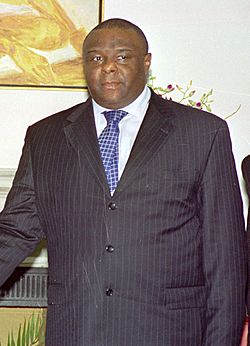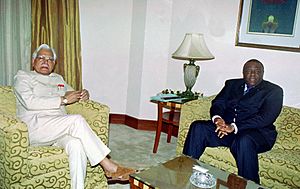Jean-Pierre Bemba facts for kids
Quick facts for kids
Jean-Pierre Bemba
|
|
|---|---|

Bemba in 2005
|
|
| Deputy Prime Minister Minister of Transport and Channels of Communication |
|
| Assumed office 12 June 2024 |
|
| President | Félix Tshisekedi |
| Prime Minister | Judith Suminwa Tuluka |
| Deputy Prime Minister Minister of Defense |
|
| In office 23 March 2023 – 12 June 2024 |
|
| President | Félix Tshisekedi |
| Prime Minister | Sama Lukonde |
| Preceded by | Gilbert Kabanda Rukemba |
| Succeeded by | Guy Kabombo Muadiamvita |
| Personal details | |
| Born |
Jean-Pierre Bemba Gombo
4 November 1962 Bokada, Equateur Province, Congo-Léopoldville |
| Nationality | Congolese |
| Political party | Movement for the Liberation of the Congo |
| Parent |
|
| Alma mater | ICHEC Brussels Management School |
| Occupation | Politician |
Jean-Pierre Bemba Gombo (born November 4, 1962) is a politician from the Democratic Republic of the Congo. He is currently the Deputy Prime Minister of Transportation. Before this, he was the Deputy Prime Minister of Defense.
From 2003 to 2006, he was one of four vice-presidents in the country's transitional government. He also led the Movement for the Liberation of the Congo (MLC), a group that started as a rebel force and later became a political party.
In 2008, Bemba faced serious legal charges at the International Criminal Court (ICC). After spending ten years in prison, his conviction was overturned on appeal in 2018. He then returned to the Congo and became active in politics again.
Contents
Early Life and Education
Jean-Pierre Bemba was born in Bokada, in what was then called Congo-Léopoldville. His father, Jeannot Bemba Saolona, was a well-known businessman. His sister, Catherine, is married to the son of a former president, Mobutu Sese Seko.
For his education, Bemba went to a boarding school in Brussels, Belgium. He later studied economics at the ICHEC Brussels Management School.
Political and Military Career
The Movement for the Liberation of the Congo (MLC)
In 1998, at the start of the Second Congo War, Bemba created the Movement for the Liberation of the Congo (MLC). He said he looked for partners in the region to support his movement and chose to work with Uganda.
In 2002, the president of the neighboring Central African Republic, Ange-Félix Patassé, asked the MLC for help to stop a coup attempt. During this time, MLC fighters were accused of harming civilians.
Role in Government
In 2003, Bemba became one of four vice-presidents in a temporary government. This government helped lead the country until elections could be held.
In 2006, Bemba ran for president. He was one of 33 candidates. His main opponent was the current president, Joseph Kabila. Bemba was very popular in the western part of the country, including the capital city, Kinshasa.
Kabila received 44% of the vote, and Bemba received 20%. Since no one got more than half the votes, a second round of voting was held between them. On August 21, 2006, there was an attack on Bemba's home while he was meeting with several international ambassadors.
Kabila won the second round of the election. Bemba disagreed with the results but said he would serve as the leader of the political opposition to keep peace in the country. In 2007, he was elected to the Senate.

International Court Case
On May 24, 2008, Bemba was arrested while in Europe. He was sent to the International Criminal Court (ICC) in The Hague, Netherlands. The charges were related to the actions of his MLC soldiers in the Central African Republic in 2002 and 2003.
His trial began in November 2010. In March 2016, the court found him guilty of war crimes and crimes against humanity. The judges said he was responsible as a commander for not stopping or punishing his soldiers. It was the first time the ICC had convicted a person based on the actions of those under their command. He was sentenced to 18 years in prison.
Appeal and Release
Bemba appealed the court's decision. On June 8, 2018, the appeals judges overturned his conviction. They ruled that he could not be held responsible for his soldiers' actions in that situation. They also noted that the lower court had ignored evidence that Bemba's ability to control his troops in another country was limited.
After his release, the court ruled that he was not entitled to payment for the time he spent in prison. The court asked member countries to review the rules about how long a person can be held while awaiting trial.
Return to Politics
On August 1, 2018, Bemba returned to the Democratic Republic of the Congo after 11 years away. He planned to run for president in the 2018 election, but he was not allowed to.
Instead, he supported another opposition candidate, Martin Fayulu. The election results were disputed, but Félix Tshisekedi was declared the winner.
Bemba has remained an important figure in Congolese politics. In March 2023, President Tshisekedi appointed him as the Minister of Defence. In June 2024, he became the Deputy Prime Minister of Transportation.
See also
 In Spanish: Jean-Pierre Bemba para niños
In Spanish: Jean-Pierre Bemba para niños
- Effacer le tableau
 | Jackie Robinson |
 | Jack Johnson |
 | Althea Gibson |
 | Arthur Ashe |
 | Muhammad Ali |

